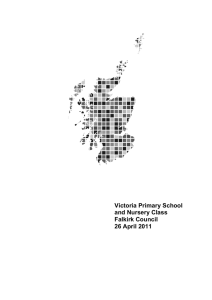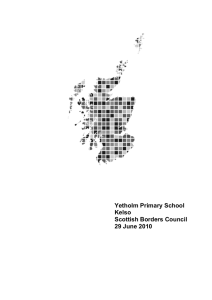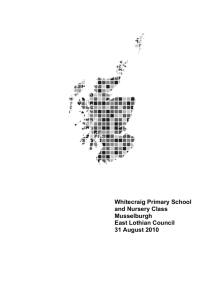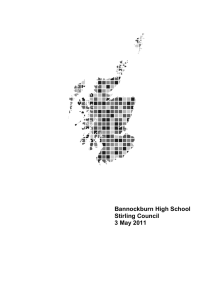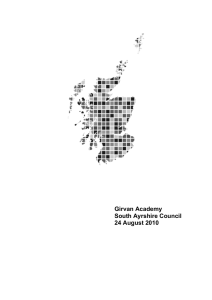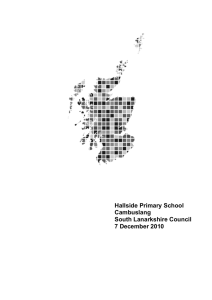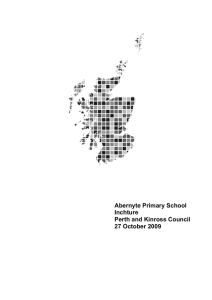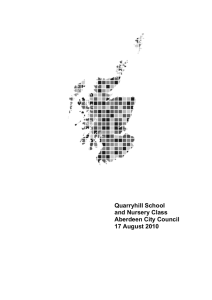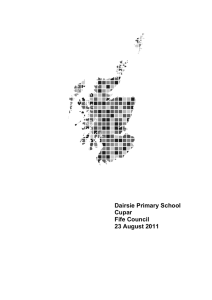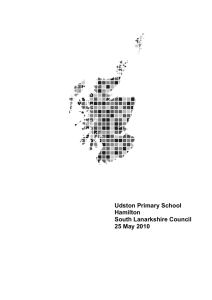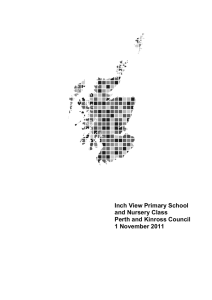Victoria Primary School and Nursery Class Falkirk Council
advertisement
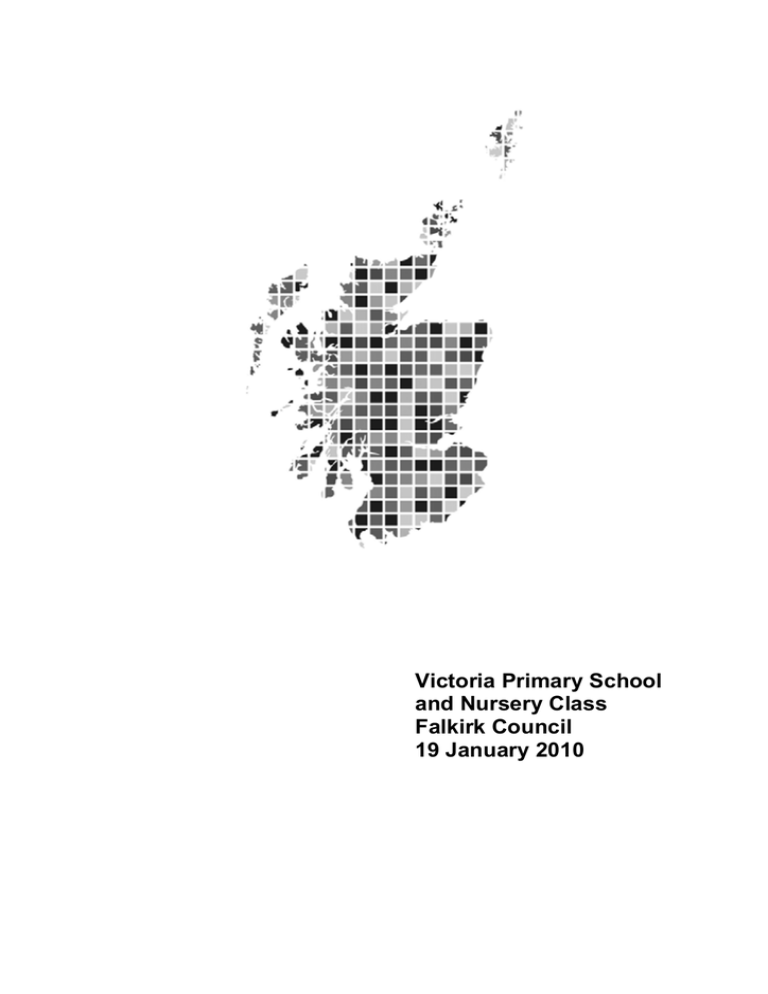
Victoria Primary School and Nursery Class Falkirk Council 19 January 2010 We published a report on Victoria Primary School and Nursery Class in April 2007. That report set out key strengths of the school and main points for action. We carried out a follow-through inspection in October 2008 and published a report on that visit in March 2009. This follow-through report is based on an inspection visit which was carried out in October 2009. It tells you about improvements since the original inspection in the quality of education which the school1 provides. It also comments on how the school is getting on with the main points for action. First we focus on changes in the core work of the school. We explain how the school has got better at helping children to learn and benefit from being at the school. Next we look at the key processes which enable this to happen, including the involvement of parents2. Our report also describes developments in the ‘ethos’ of the school, by which we mean how well children are cared for and how much is expected of them in all aspects of school life. Finally we comment on improvements in leadership to help the school achieve its aims. A copy of this report has been placed on the HMIE website www.hmie.gov.uk. Where applicable, you will also find descriptions of good practice in the school and analyses of questionnaire returns. 1 2 The term ‘school’ is used to include the work of the nursery class, where relevant. Throughout this report, the term ‘parents’ should be taken to include foster carers, residential care staff and carers who are relatives or friends. Contents 1. The school 2. Particular strengths of the school 3. How well do children learn and achieve? 4. How well do staff work with others to support children’s learning? 5. Are staff and children actively involved in improving their school community? 6. Does the school have high expectations of all children? 7. Does the school have a clear sense of direction? 8. What happens next? 1. The school Victoria Primary School and Nursery Class serves an area in east Falkirk. 2. Particular strengths of the school • Children’s wider achievements and their improved motivation. • The leadership and commitment of the headteacher. • Polite, well-behaved, courteous children. 1 3. How well do children learn and achieve? Learning in the nursery class and the enhanced provision classes continues to take good account of children’s interests and prior learning. Nursery staff are now making better use of information from observations of children to plan appropriate learning experiences. In the primary classes, staff are improving approaches to learning and teaching, including making better use of information and communications technology. Children’s skills in talking and listening continue to improve. Children listen well to staff and, with support, to others in group work. Children do not yet have enough opportunities to work independently. Overall, attainment in English language and mathematics has not improved. The pace of learning is still too slow and children are not always sufficiently challenged by classwork. Children now benefit from improvements to the curriculum. Across the school and the enhanced provision classes children now experience a broader and more balanced range of activities. Most teachers are making more effective use of cross curricular work to help children make more meaningful links in their learning. In environmental studies, most teachers take greater account of children’s interests and prior learning to ensure learning experiences are more relevant for children. Staff are at an early stage of developing the national initiative Curriculum for Excellence. The quality of homework across the school is not yet consistently high enough. 4. How well do staff work with others to support children’s learning? Staff and other partners now work together better to ensure that children continue to make progress in their learning. Most teachers are organising lessons better and as a result are meeting children’s learning needs more effectively. However, the level of challenge for children is not yet high enough. Across the school, most classroom assistants support children well. The support for learning teacher works effectively with individuals and groups of children. Teachers 2 within the enhanced provision classes are working better with other agencies to support children at all class stages. School staff are working more closely with parents, for example, by providing useful advice on how they can support their children’s learning. 5. Are staff and children actively involved in improving their school community? Children feel that their views are listened to and acted upon. They have been involved in changes to many areas of the school including helping to develop the school grounds. Staff, with the support of the education authority, are developing arrangements for further improving the school. Staff review the work of the school and agree priorities for improvement. The headteacher and quality improvement officer have undertaken classroom observations. These arrangements are helping to improve aspects of learning and teaching in most classes. The senior management team now need to focus their learning visits on supporting improvements in learners’ experiences and attainment. The systems for tracking children’s learning are not yet effective enough to ensure that all children make appropriate progress. Staff need to become more involved in tracking the progress of children’s attainment. 6. Does the school have high expectations of all children? Children are courteous and show respect to each other and staff. Staff are now setting higher expectations for behaviour and children are responding well. Parents have supported recent developments to improve behaviour and the school’s exclusion rate has improved. Children feel safe and happy in school. The school regularly celebrates children’s achievements in class and at assemblies. Teachers now need to have much higher expectations of children. 3 7. Does the school have a clear sense of direction? The education authority is working well with the school to support improvements. The headteacher has a clear sense of direction which is focused on bringing about further improvements for children. There is scope to develop further the role of the leadership for learning across the school. Staff and children are more actively involved in their school and work well together to secure improvements. 8. What happens next? The school has improved some key areas of its work since the original inspection. The structure of the curriculum, children’s learning experiences and self evaluation are now at a satisfactory or better level. Most children have their learning needs appropriately met. Attainment in English language and mathematics has not improved enough. Aspects of the wider leadership of the school need to improve further. As a result, we will carry out a further follow-through visit to the school, within one year of the publication of this report, and will report to parents on the extent of the improvement that has been achieved. HM Inspector: Sadie Cushley 19 January 2010 4 When we write reports, we use the following word scale so that our readers can see clearly what our judgments mean. excellent very good good means means means satisfactory weak unsatisfactory means means means outstanding, sector leading major strengths important strengths with some areas for improvement strengths just outweigh weaknesses important weaknesses major weaknesses If you would like to find out more about our inspections or get an electronic copy of this report, please go to www.hmie.gov.uk. Please contact us if you want to know how to get the report in a different format, for example, in a translation, or if you wish to comment about any aspect of our inspections. You can contact us at HMIEenquiries@hmie.gsi.gov.uk or write to us at BMCT, HM Inspectorate of Education, Denholm House, Almondvale Business Park, Almondvale Way, Livingston EH54 6GA. Text phone users can contact us on 01506 600 236. This is a service for deaf users. Please do not use this number for voice calls as the line will not connect you to a member of staff. You can find our complaints procedure on our website www.hmie.gov.uk or alternatively you can contact our Complaints Manager, at the address above or by telephoning 01506 600259. Crown Copyright 2010 HM Inspectorate of Education
